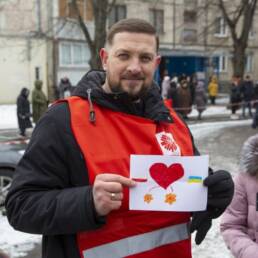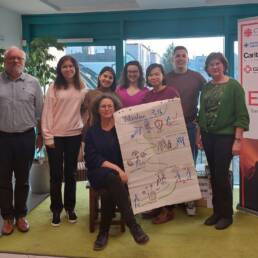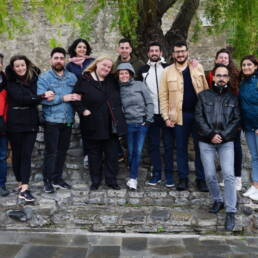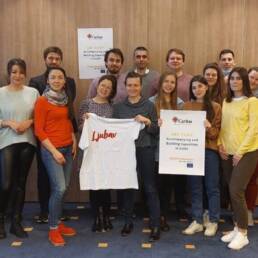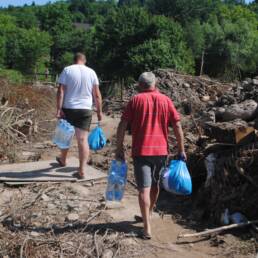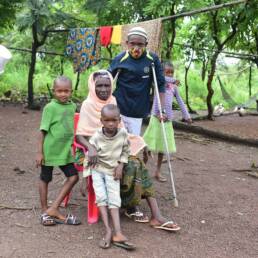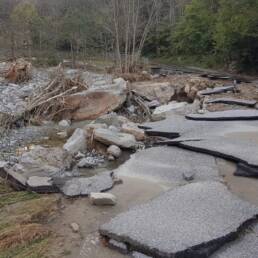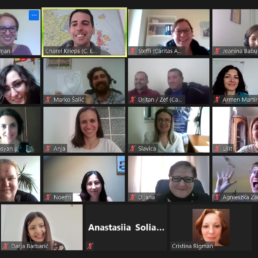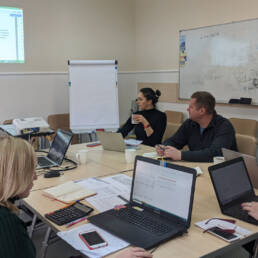Author
Charel Krieps
Humanitarian Officer
Caritas Europa
11 Caritas organisations trained on community-based disaster risk reduction and organisational emergency preparedness planning
After the first training on volunteer management in summer, the consortium of nine Caritas organisations involved in the ABC-EUAV project, as well as Carita Albania and Caritas Turkey, organised their second workshop at the end of October 2020. This workshop consisted of two back-to-back training parts on topics that are closely intertwined: community-based disaster risk reduction (DRR) and emergency preparedness planning.
From making communities more resilient in the face of disasters…
The first three days of the training looked at community-based disaster risk reduction. It was focused on how Caritas can better support local communities exposed to natural hazards to become stronger and more resilient.
Over the past decades, the participating organisations witnessed a steady rise in natural disasters in their countries. These disasters include floods, flash floods, earthquakes, and others. While large-scale disaster management is usually the responsibility of state authorities, Caritas is often present in smaller, remote communities that are highly vulnerable to natural hazards.
In the training, the participants learned how to start working with local communities that are exposed to disaster risks. The first step is to understand the danger, to analyse the hazards that the people are facing, and to identify the elements at risk (life, houses, jobs, cattle, etc.). This is necessary before coming up with ideas to reduce the vulnerability of community members.
The group also looked at different methods to engage communities. Volunteers can sometimes play a great role in facilitating and supporting this process. And finally, the trainers also gave an introduction to the free software KoBoToolbox, a tool often used to collect information in communities.

…to preparing our Caritas organisations to be ready during an emergency
The second two-day part of the training focused on organisational emergency preparedness planning (EPP). This is a process internal to a Caritas organisation through which it prepares to respond to any future emergency. In this process, the organisation needs to identify existing capacities and gaps, and plan and implement a series of actions to increases its capacity to respond.
EPP is an essential process that can make an organisation react much quicker and more efficiently in emergency situations. Many questions arise during this process. They need to be discussed in a team consisting of staff members from different units within an organisation, such as staff from the emergency response team, the social team, the management, but also the finance, administration, and communication departments. Who decides if a Caritas will provide relief during an emergency, and according to which criteria? Which key staff members need to be involved in the response? What are the different steps to be taken within the first 24 hours after the disaster, within the first days, and within the first weeks? With whom does the organisation need to collaborate and coordinate their actions?
The participants will discuss these questions with their colleagues over the coming months and formalise them in organisational emergency plans. If you work for a Caritas organisation and are interested in finding out more about our work on organisational emergency preparedness planning, you can find the training materials on Baobab.
The ABC-EUAV is a capacity-building project funded under the EU Aid Volunteers initiative. The aim is to strengthen the organisations involved in different areas to prepare them to send or host EU Aid Volunteers. The training on emergency preparedness planning is based on a methodology developed by Trócaire and Cordaid in the SCORE project, another capacity building project of the EU Aid Volunteers initiative. The materials can be found here.


